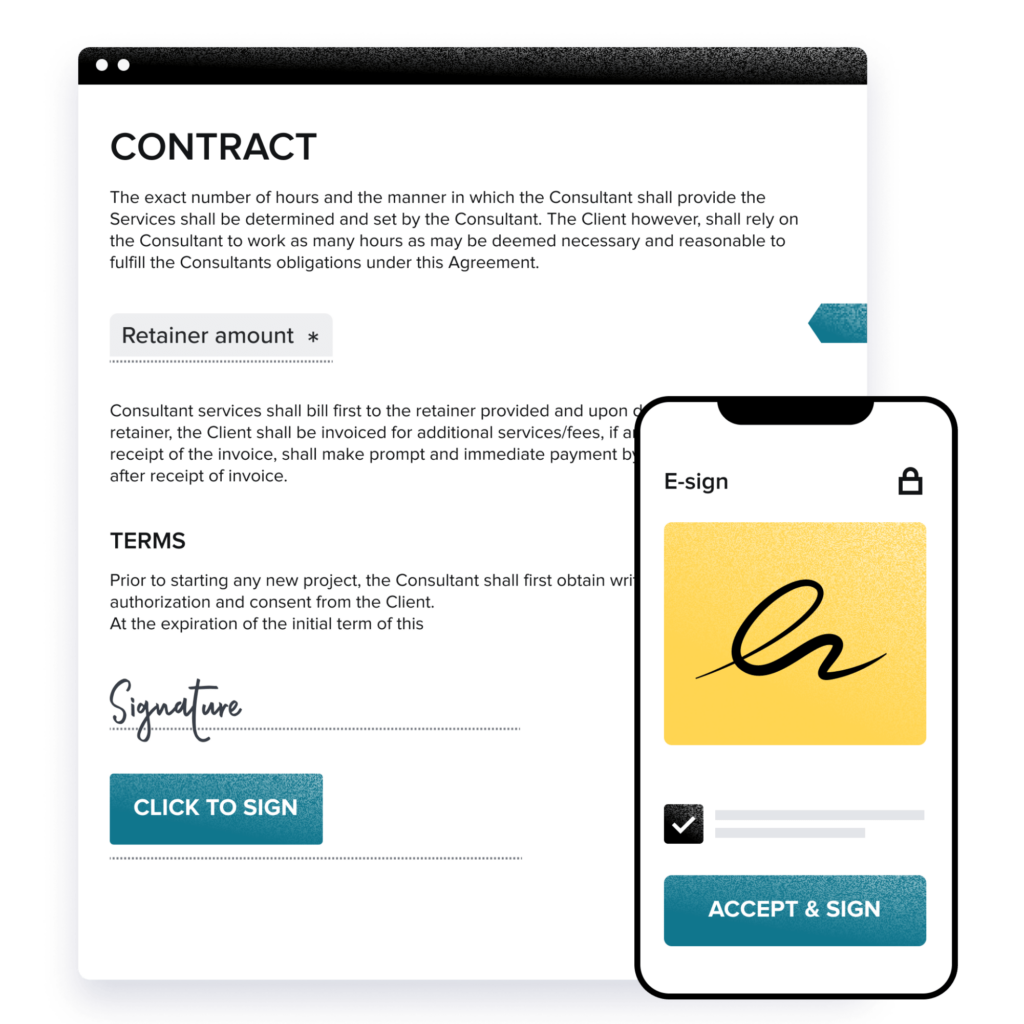Learn about the most important elements of a contract. These elements can protect you and your clients while avoiding any confusion down the road.
Building legally binding contracts is an essential practice for any business. After all, contracts provide legal protection for businesses and clients alike. Moreover, high-quality contracts convey a level of professionalism to your potential clients and build confidence in their relationship with you.
But, as a business owner, chances are that you’re not a contract professional or legal expert. You focus on what you do best — improving the product or service you’ve built your business around. So, how do you ensure your contracts are up to par?
HoneyBook’s tools make it easy to build and send custom business contracts in no time flat. Before you get started, it’s important that you understand the basic elements of a contract.
Jump to:
- Essential elements for all business contracts
- Essential elements to include for independent business owners
- What would make a business contract unenforceable
- How HoneyBook makes business contracts simple
Essential elements for all business contracts
Not all contracts are binding agreements, meaning they don’t all hold up in court. After all, simply getting a client to sign a document doesn’t mean you’ll be able to legally enforce the conditions of that document. All business contracts must have several essential elements to be considered legally binding. Those elements include:
The offer
Contracts must include an offer. This is the product or service that the business owner agrees to provide for the client. For example, if you’re a roofer, the offer in your contract may be to repair or replace a roof.
When you create the offer in your contract, it’s important to be as clear and detailed as possible. Sticking with the roofing example, you wouldn’t want your contract to simply say that you’re repairing a roof. Instead, your contract should outline the type of repair you’re making, how much material is expected to be involved in that repair, and, if you bill based on man hours, how many man hours you expect the job to take.
The goal here is to give as many details as it takes for there to be no confusion on the product or service the contract is based on.
Party acceptance
Both parties involved in the contract must clearly accept the terms of the agreement. That means that, at the very least, both parties must sign and date the document. However, it may be wise to go a step further than that.
In many cases, it makes sense to have the client initial next to specific stipulations that may be cause for debate in the future. For example, if your contract explains what leads to a late fee and how much it costs, it’s probably a good idea to have your clients place their initials next to this information to prove they are aware of it.
Party awareness
The awareness element of a contract is commonly known as the “meeting of minds.” Ultimately, for a contract to be legally binding, both parties need to know and agree that they are entering into the contract. There can’t be any misleading comments or statements in the contract, and the parties involved in the agreement must be of sound mind.
Party consideration
Party consideration is the most important aspect of a business contract. It’s the quid pro quo, if you will. Essentially, for the product or service provider, the consideration is agreeing to provide the product or service in a timely and high-quality fashion. On the client side of the contract, consideration relates to the client’s willingness and agreement to promptly pay the product or service provider the amount of money due.
Legal capacity of parties
It’s important to keep in mind that some parties may not have the legal capacity to sign agreements. For example, say you provide a business-to-business service, and you speak to a sales representative about a piece of software that could help the business they work for keep better track of its customers. Even if the sales representative agrees to sign your contract, it’s likely that they don’t have the legal capacity to make the agreement binding. As such, the agreement would be deemed to be null.
This may play a role in business-to-consumer agreements as well. After all, children don’t have the legal capacity to enter agreements. In addition, some adults who have given power of attorney to other parties can’t consent to contracts either. So, be sure that whoever you sign an agreement with has the legal capacity needed to execute that agreement.
Legality of the agreement
Legal contracts are only legal if they can be upheld by law. As such, it’s generally a good idea that your contract explicitly states the laws that uphold it. For example, if you’re a Florida-based company, your contract may include something like:
“This agreement is governed by the laws of the state of Florida. Should any provision of this contract be deemed invalid or unenforceable, all other provisions shall remain valid and enforceable.”
This is important, as laws differ from state to state. All parties should be clear on the laws that govern the agreement.
Essential elements to include for independent business owners
The above elements of a business contract all pertain to the legality of the contract. However, there are some elements that go beyond legality and are important for different types of contracts. These aspects generally pertain to service providers and set contractual obligations for timelines, payment, and specific factors you want your clients to be aware of.

Timeline
It’s a wise idea to include the timeline of any project in your contracts. This will avoid any confusion for both parties. For example, if you provide a roofing service and you repair a company’s roof, your agreement may state that you plan on completing the job in no longer than 90 days.
Having this timeline in your contract means your client isn’t able to argue that you told them the job would be done sooner or that they believed the job would go faster. With a clear timeline written into your contract, everyone will be on the same page regarding expectations.
Situations of breach or cancellation
Your contract should also include a section on breach or cancellation terms. In the situations of breach section of your contract, describe exactly what may qualify as a breach of contract. For example, if you’re a public relations professional, you may have a list of things you expect your clients to avoid doing in the public eye. If they don’t refrain from those things, their actions represent a breach of contract. In this case, you should list all actions that may result in a breach.
It’s also important to make your cancellation policy clear. That’s the case whether you allow cancellations or not. If cancellations are not allowed, that should be clearly stated. If they are, you should clearly state what conditions must be met for a cancellation to take place.
Payment terms
Your contract should always include the amount of money you expect your clients to pay you, but that’s not all. It’s important that you outline all terms associated with the payment. For example, you should make payment due dates and payment methods clear in your contract. This way, there will be no confusion surrounding when payments are due and how you expect those payments to be made in the future.
If your clients have different payment options, like the option to pay for service in one lump sum or to make monthly or quarterly payments, those options and the one the client chooses should be clear in your agreement.
Clauses
You should include any clause that may be important in your agreement. For example, you may decide that your contract needs a confidentiality clause, otherwise known as a non-disclosure agreement. Including the confidentiality clause means that the other party in the contract won’t be allowed to tell other people how you do business, protecting your company from predation by competitors.
Other common clauses include force majeure and the forced arbitration clause. It’s important to include any clauses you deem important for your business and the agreement in particular.
What would make a business contract unenforceable?
Not every contract is an enforceable contract. There are a few things that could make your contract unenforceable. Some of the most important factors to watch out for include:
- Legal capacity of parties – Make sure all parties are legally able to agree to the terms of the contract.
- Legality of the agreement – The agreement must include legal terms. For example, an agreement that stipulates usury interest rates may be deemed unenforceable.
- Misrepresentation – If you misrepresent yourself, your products, or your services in the contract, the contract is unenforceable.
- Coercion – If a party is coerced into the agreement, you will not be able to enforce the stipulations of the contract.
- Undue influence – A party who uses their influence over another party to get them to sign an agreement via peer pressure makes the agreement unenforceable.
If any of these factors are involved, it can make your contract unenforceable, but it can also make your business vulnerable to legal action.
Are verbal contracts legally binding?
Oral contracts can be binding, but they can be very difficult to prove. If you’re a business owner, it’s important to have your contracts in writing.
Are digital signatures legally binding?
Yes, esignatures are completely legal and binding thanks to The Electronic Signatures in Global and National Commerce Act.
How HoneyBook makes business contracts simple
Writing a contract by hand can be a daunting process. Moreover, it’s easy to miss important factors that make your contract valid and enforceable.
Stop wasting your time — it’s time to choose HoneyBook for your contract management needs. With HoneyBook, you can customize pre-built contract templates that not only include everything necessary to ensure your contracts are enforceable but also enhance your overall client experience. With the HoneyBook Template Gallery, you will discover a variety of templates designed to help you look professional, save time, and streamline your contract management. Find out how HoneyBook can elevate your business today.
Disclaimer: The advice featured in this guide and on the blog is for sharing general information and knowledge. For specific legal advice, please consult an authorized professional.






